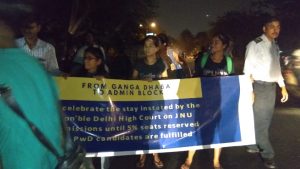After a long struggle, the final verdict of case NFB vs. Union of India regarding reservation policy for the PWD candidates in M. PHIL and P.H.D. programs has released.
The Delhi High Court has directed the JNU Administration to ensure the 5% reservation for PWD Candidates in M. PHIL Ph.D. programs on the basis of total number of seats and the Court also directed to take admission of 2 students, who had successfully qualified the viba and were denied admission in the ongoing academic year in their respective subjects.
As we are aware of the fact that time and again JNU has been refusing to comply with the 5% reservation stated by the ‘Rights of Persons with Disability (RPD) Act’ in relation to the admission for M. Phil. and Ph. D. programs for many years. Further, this attitude of University Administration continued in the 2018-19 academic year and did not comply with the RPD Act’. Taking this clause of the RPD into consideration, 36 seats out of the total 723 should have had to be reserved for disabled candidates. 32 candidates qualified the written exam, 20 candidates appeared for the viva and 17 cleared the viva. But only 15 students were given admission, instead of the 17 who had qualified for it. Two students were unfairly denied admission in Sanskrit and Comparative Political Theory. Section 32, of the RPD Act’ has outrightly violated. As per the section, the University must admit students across disciplines rather than ‘subject wise allocation’. The basis of ‘subject wise allocation’ of seats was the precondition of “leftover seats” in subjects of concern. The JNU Visually Challenged Students’ Forum, in collaboration with the National Federation for the Blind (NFB), on April 18th, 2018, filed a petition in the Delhi High Court against the JNU administration’s repeated violations of the Rights of Persons with Disability Act of 2016. The High Court consequently imposed a three-month stay on M. Phil. and Ph. D. admissions. In the next hearing, the court ordered the JNU administration to furnish the M. Phil and Ph. D. results so that it could examine if the reservation policy had been properly implemented. The results were declared, and it was found that the reservation policy hadn’t been fully implemented. After a long struggle, the Court ordered the JNU administration to admit the 2 students who had successfully qualified the viva but hadn’t been admitted earlier. The Court also asked the JNU administration to furnish a blueprint of how seats would be reserved for the upcoming academic year 2019-20.
Finally, in the Court hearing of October 29th, 2018, the JNU administration ensured the Court that the 2 students unfairly denied admission before would be admitted at the earliest. The JNU Administration has submitted an affidavit regarding the same.
In the final hearing, which was on 12th November, both parties submitted the final arguments.
JNU Administration; came with the argument that JNU will take admission according to the availability of the faculties of every subject. But MR. RUNGTA counter-argued that faculties cannot be the reason of excuse. And seats for the PWD candidates must be full filled according to Section 32, (RPD) Act which clearly states that every higher educational institution must full filled not less than 5 % seats. After the final hearing, the court strictly directed JNU Administration to take admission of both students who were denied for the admission after qualifying viba and hadn’t been admitted earlier.
Court also directed JNU to ensure 5% seats for PWD candidates according to Section 32, (RPD) Act in the upcoming academic years.
Dheeru Yadav

